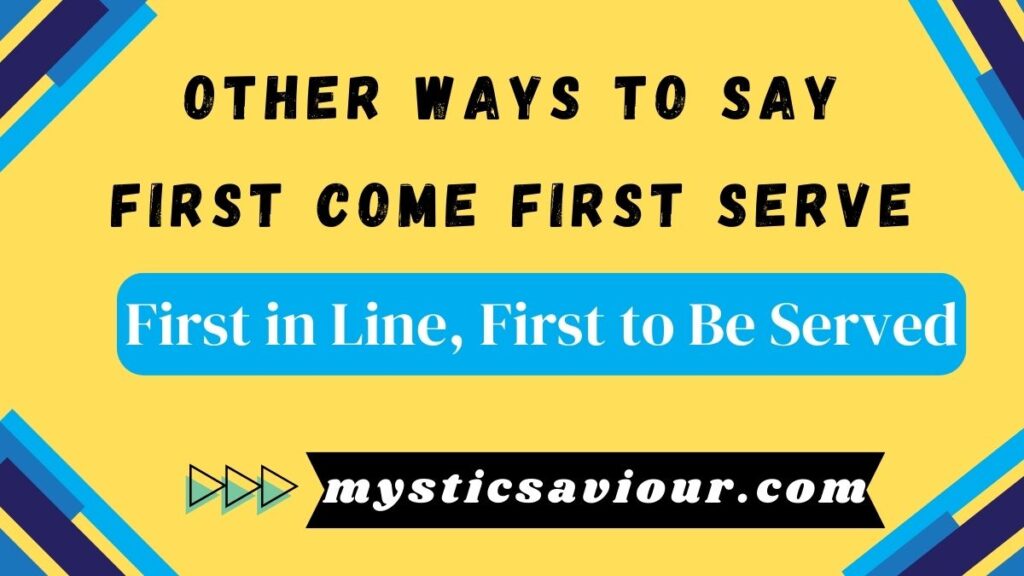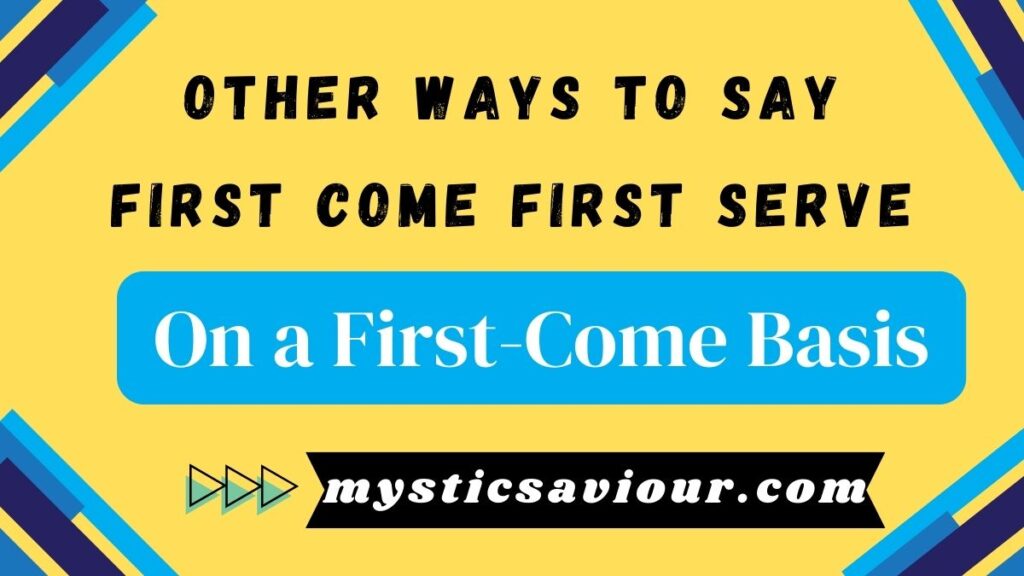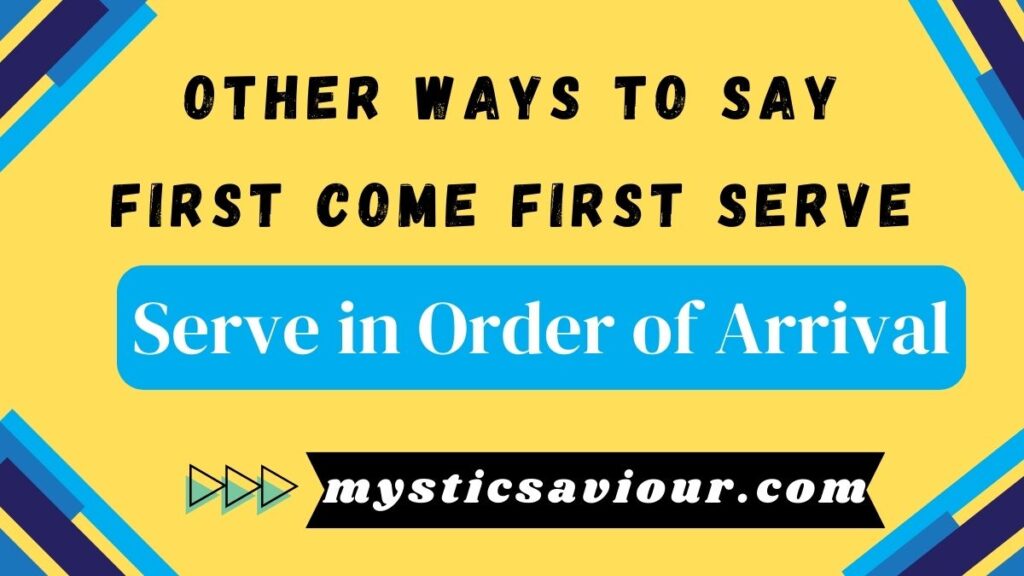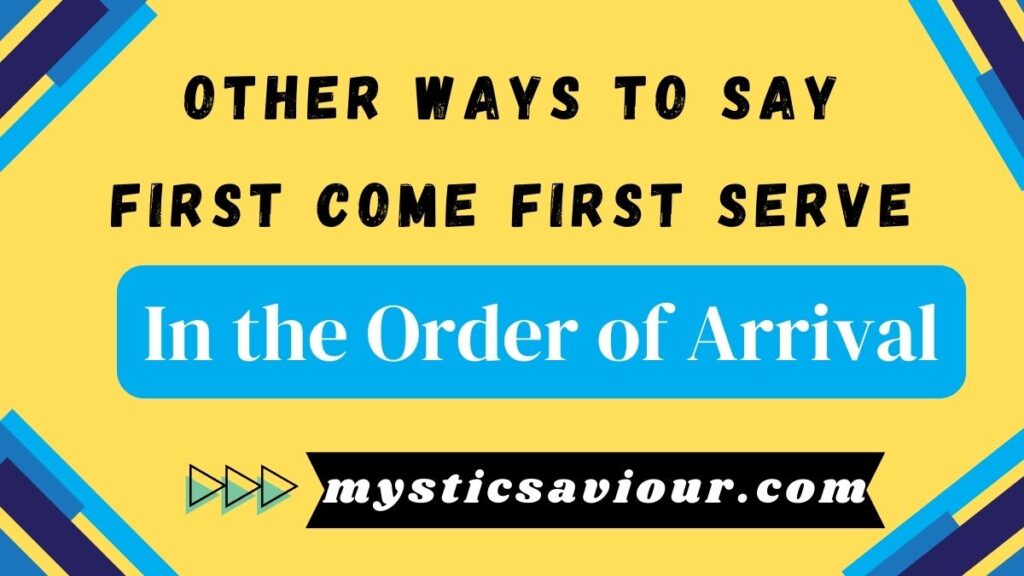The phrase “first come, first serve” has been widely used to describe the principle that those who arrive earliest are given priority. This FCFS concept is a fair and effective way to allocate services or resources based on arrival order, ensuring that everyone is treated equally according to their timeliness. It’s commonly seen in scenarios ranging from restaurant queues to ticket sales or customer service lines. But just because a phrase is popular doesn’t mean it’s the only option.
Looking for fresh ways to express the same concept? Let’s take a journey through 13 alternative ways to say “first come, first serve”, each with its own flair and application, adding variety to your vocabulary and improving your communication. These alternatives can be tailored for both casual and professional settings, so you’ll never sound repetitive again.
By exploring these alternatives, you’ll discover how each expression uniquely conveys the idea of priority access or early arrival advantages. Whether you’re managing a queue, setting up a promotion, or simply enhancing your writing, these options will help you communicate more effectively and engage your audience with new perspectives.
Understanding the “First Come First Serve” Principle
Before diving into alternatives, let’s break down the first come first serve principle. At its core, it’s a fairness rule based on the arrival order of people or things. Whether it’s queue service or an event registration, the person or entity that arrives first gets the first opportunity to be served or take action. This ensures a structured and fair allocation system, preventing confusion or disputes.
This principle is widespread, especially in business operations, customer service, and everyday scenarios like waiting in line at the grocery store. But as the FCFS model becomes more ubiquitous, it’s worth considering other ways to express the same concept.
1. First in Line, First to Be Served

When you think of queue order or lining up, “first in line, first to be served” is a natural expression. It’s commonly used in situations where individuals physically line up, whether at a store, for tickets, or during a checkout process.
Example:
- At the coffee shop, the first in line, first to be served policy ensures customers waiting for their morning brew get served promptly.
This alternative stresses the order in queue, and it’s perfect when you’re referring to scenarios where people are physically waiting for service.
2. Early Bird Gets the Worm
One of the most widely recognized idioms in the English language, “early bird gets the worm” conveys the message that those who take prompt action or arrive early will reap the rewards. It highlights the advantage of being proactive and seizing an opportunity before others.
Example:
- To secure the best seats at the event, remember, the early bird gets the worm.
This phrase works particularly well in informal settings, such as when encouraging prompt arrival for an event or purchase.
3. On a First-Come Basis

Another professional alternative to “first come, first serve” is “on a first-come basis.” This phrase is straightforward and is often used to explain how services or resources are allocated in the order of arrival.
Example:
- The tickets for the concert are available on a first-come basis, so don’t miss out!
This expression is versatile and can be used across a wide variety of contexts, including business dealings, promotional events, or even in professional services.
4. First to Arrive, First to Be Helped
If you’re looking for a phrase that emphasizes early assistance, consider saying “first to arrive, first to be helped.” This expression is particularly effective in customer service environments, as it underscores the priority of helping those who are prompt.
Example:
- Our customer service operates on the first to arrive, first to be helped rule, ensuring that we respond quickly to early requests.
This variant is ideal when dealing with customers or clients, making it clear that quick responses are given to those who arrive first.
5. Whoever Comes First Gets Served First
Slightly more informal but equally effective, “whoever comes first gets served first” directly communicates the idea of prioritizing those who show up first. It’s a simple yet effective way to establish a clear system.
Example:
- Whoever comes first gets served first at the food stand, so arrive early if you want your favorite dish.
This phrase works well in casual settings like food trucks, service queues, or any environment where there’s a clear and easy-to-follow process.
6. Priority Given to Early Arrivals
When you want to communicate that certain people receive preferential treatment due to their timely arrival, “priority given to early arrivals” is a polished and clear way to state it.
Example:
- Priority is given to early arrivals during the holiday sale, so be sure to arrive early for the best deals.
This is a fantastic option for businesses or events where customers or participants benefit from an early arrival.
7. Serve in Order of Arrival

A more formal way to state that service will be granted according to arrival time is to say “serve in order of arrival.” It’s efficient and clear, making it perfect for professional or customer-facing settings.
Example:
- The clinic will serve in order of arrival to ensure fairness and reduce wait times.
This phrasing is ideal for businesses that want to emphasize a structured and orderly system for processing clients, patients, or customers.
8. First Arrived, First Served
This expression is very close to the first come first serve principle but feels a bit more formal and structured. It works well in both casual and professional environments.
Example:
- At the event, we’ll adhere to the first arrived, first served rule to allocate seating.
Using “first arrived, first served” can lend a bit of professionalism while maintaining the fairness element of the FCFS system.
9. Earliest Come, Earliest Served
This variation is an alternative to “first arrived, first served” and emphasizes the earliest arrival in the order of service. It works well for situations where the timing of arrival is crucial.
Example:
- Earliest come, earliest served applies to all reservations, so make sure to confirm your booking early.
This phrase is suitable for reservation systems or any environment where timeliness is key to securing an advantage.
10. First Claim, First Serve

The phrase “first claim, first serve” is often used when something is available for reservation or claiming before others. It highlights the concept of securing something early before it runs out.
Example:
- The VIP tickets are available for first claim, first serve, so grab yours before they’re gone.
This alternative is great when talking about limited resources or exclusive offers, such as limited-edition products or early bird reservations.
11. Order of Appearance, Order of Service
In more formal contexts, “order of appearance, order of service” clearly conveys that services will be rendered according to when an individual appears or arrives.
Example:
- During the formal conference, we’ll serve in the order of appearance, order of service to ensure a smooth flow of activities.
This variant is particularly useful for events, conferences, or performances where individuals are processed based on their appearance order.
12. Whoever Gets There First, Gets Served First
This expression is similar to “whoever comes first gets served first” but adds a casual tone. It’s simple, direct, and gets the point across quickly.
Example:
- Whoever gets there first, gets served first at the concession stand, so don’t wait until the last minute.
This phrase can be used in informal settings, like a sporting event or a festival, where the urgency of arrival is critical.
13. In the Order of Arrival

A simple and professional phrase, “in the order of arrival” is used to describe that services or opportunities will be provided based on the sequence of people’s arrival times.
Example:
- We process all applications in the order of arrival to ensure fairness and efficiency.
This phrase works well in structured environments like office settings or for job applications, where people need to be served in an orderly manner.
Conclusion
In conclusion, exploring the 13 other ways to say “First Come First Serve” (With Examples) opens up a variety of options for clearer and more engaging communication. These alternatives can make your language feel fresher and more adaptable to different situations. Whether you’re using them in business, customer service, or casual conversations, they help convey the same important principle of fairness and priority.
By incorporating these phrases into your vocabulary, you can express the first come first serve principle in more dynamic ways. The 13 other ways to say “First Come First Serve” (With Examples) provide you with the flexibility to speak or write with confidence, making sure your message is both clear and effective.
FAQs
What’s the best alternative to “first come, first serve” for a formal business setting?
- For formal business contexts, phrases like “serve in order of arrival” or “order of appearance, order of service” are ideal as they convey professionalism and clarity.
Can I use these phrases for customer service?
- Yes, many of these alternatives, such as “first to arrive, first to be helped,” are great for customer service and can set the tone for efficient, timely assistance.
Why does “early bird gets the worm” work well?
- This idiom emphasizes proactivity and the advantage of acting promptly. It’s perfect for casual, motivational settings like sales or event promotions.

Sophie Bell is a creative writer at Mystic Saviour, specializing in Word Mechanics, Name Narratives, and Linguistic Twists. She brings a passion for language and storytelling, helping readers explore unique and engaging ways to enhance their writing.










